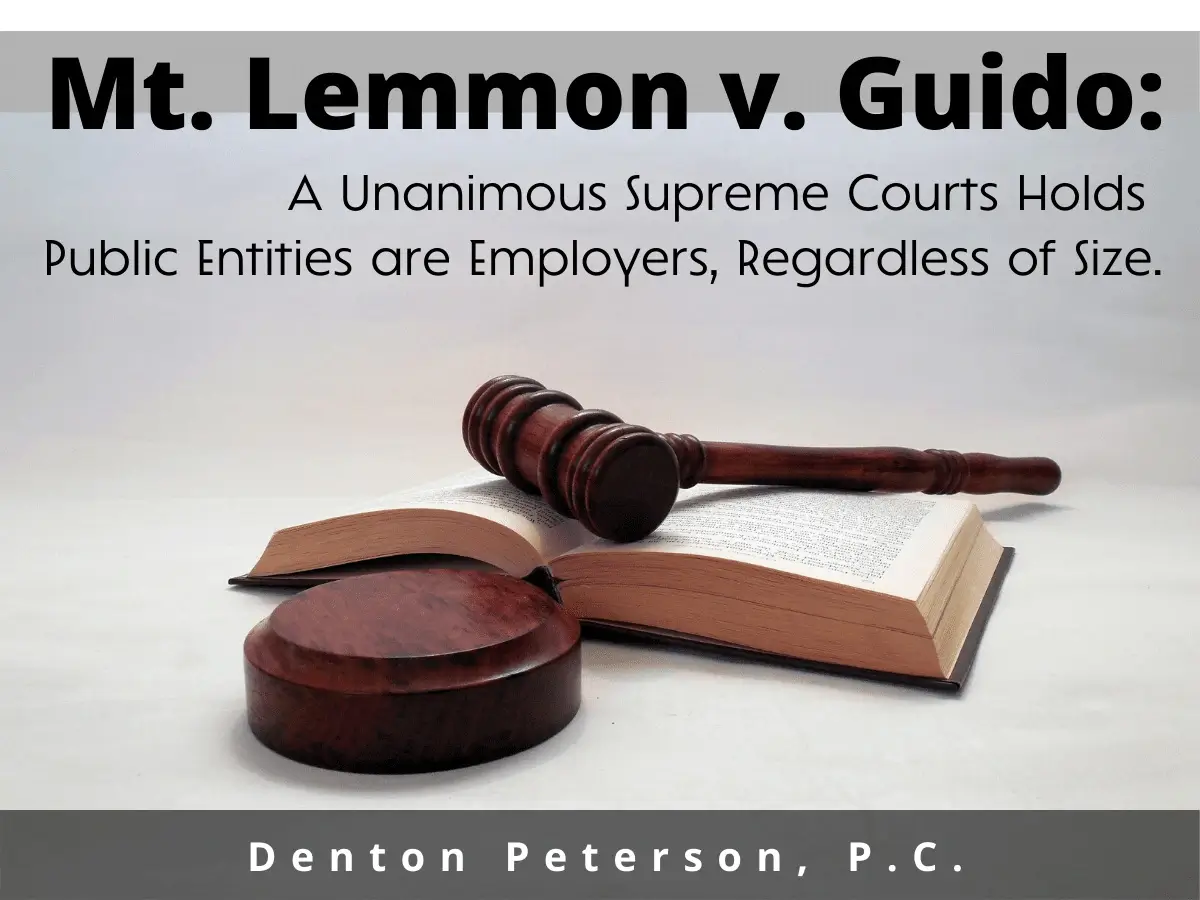Mt. Lemmon v. Guido: A Unanimous Supreme Courts Holds Public Entities are Employers, Regardless of Size
In November of 2018, all the Supreme Court Justices (except Brett Kavanaugh, who had not taken the bench yet) were in agreement when they handed down their decision in Mt. Lemmon Fire District v. Guido. According to the Age Discrimination in Employment Act (ADEA), public entities are employers, regardless of the entity’s size.
The story of the case
In 2009, Mt. Lemmon Fire District was facing constraints on its budget, and as a result, terminated John Guido, then 46 years of age, and Dennis Ranking, then aged 54. Both Mr. Guido and Mr. Rankin were the most senior firefighters in the district, in terms of both age and rank.
The two firefighters filed a successful age discrimination complaint with the Equal Employment Opportunity Commission (EEOC), and in 2013 sued the Mt. Lemmon Fire District in federal court, claiming they had been terminated on the basis of their age, in violation of the ADEA. The fire district, in return, contested that the case could not even be heard because the district did not qualify as an employer within the meaning of the ADEA. The language the fire district referenced within the ADEA stated that an employer was one “engaged in an industry affecting commerce who has 20 or more employees.” The District Court agreed with the fire district and granted Mt. Lemmon Fire District’s motion for summary judgment.
The firefighters appealed to the 9th Circuit, which overruled the District Court’s ruling. Then, the fire district appealed this decision to the Supreme Court, to decide whether a public entity with fewer than 20 employees was considered an employee under the ADEA.
The Supreme Court decision
The fire district presented its argument to the Supreme Court that it could not be an employer under the ADEA because it had fewer than 20 employers. The Supreme Court, however, was not convinced. In its unanimous opinion, the Court pointed out that the ADEA also defined employers as “a State or political subdivision of a State, and any interstate agency,” regardless of the number of employees. Although the fire district argued that the 20-employee requirement applied to public employers as well as private employers, the Court disagreed. The Court also looked to the Fair Labor Standards Act (FLSA) for guidance, emphasizing that the FLSA included public employers of all sizes.
The fire district’s final argument was that interpreting the ADEA to include public employers with fewer than 20 employees would harm the operations of small public service providers, to the detriment of the public depending on those services. The Supreme Court rejected that argument, however, pointing out that no such impact had been shown despite the fact that the Equal Employment Opportunity Commission (EEOC) has consistently interpreted the ADEA to apply to small public entities.
What does it mean?
The impacts of this decision will be limited to small public entities and their employees, but that does not mean the impacts will necessarily be insignificant. Public entities must now ensure that they adhere to all the requirements of the ADEA in their employment practices. This will likely lead to increased legal compliance costs for public entities that have not already made it a practice to get ADEA compliant.
For people employed by small public entities, it is important to be aware of the new rights granted by this Supreme Court decision. This case now ensures that the protections of the ADEA are extended to employees of public entities regardless of size. Public employees who think they may have an ADEA claim, or who have abandoned ADEA claims because they did not think the ADEA applied to them and their employer, should seriously consider meeting with an experienced employment attorney to determine whether their claims are worth pursuing.
Denton Peterson Dunn, PLLC has a team of experienced employment law attorneys who have been practicing in Arizona for more than two decades, handling a wide variety of employment matters. If you know or suspect you may have an employment law claim, contact our office today to set up a consultation with an experienced employment law attorney who will make sure your rights are protected.

Brad Denton – Denton Peterson Dunn, PLLC
1930 N Arboleda #200
Mesa, AZ 85213
Office: 480-325-9900
Email: [email protected]
Website: https://arizonabusinesslawyeraz.com/
